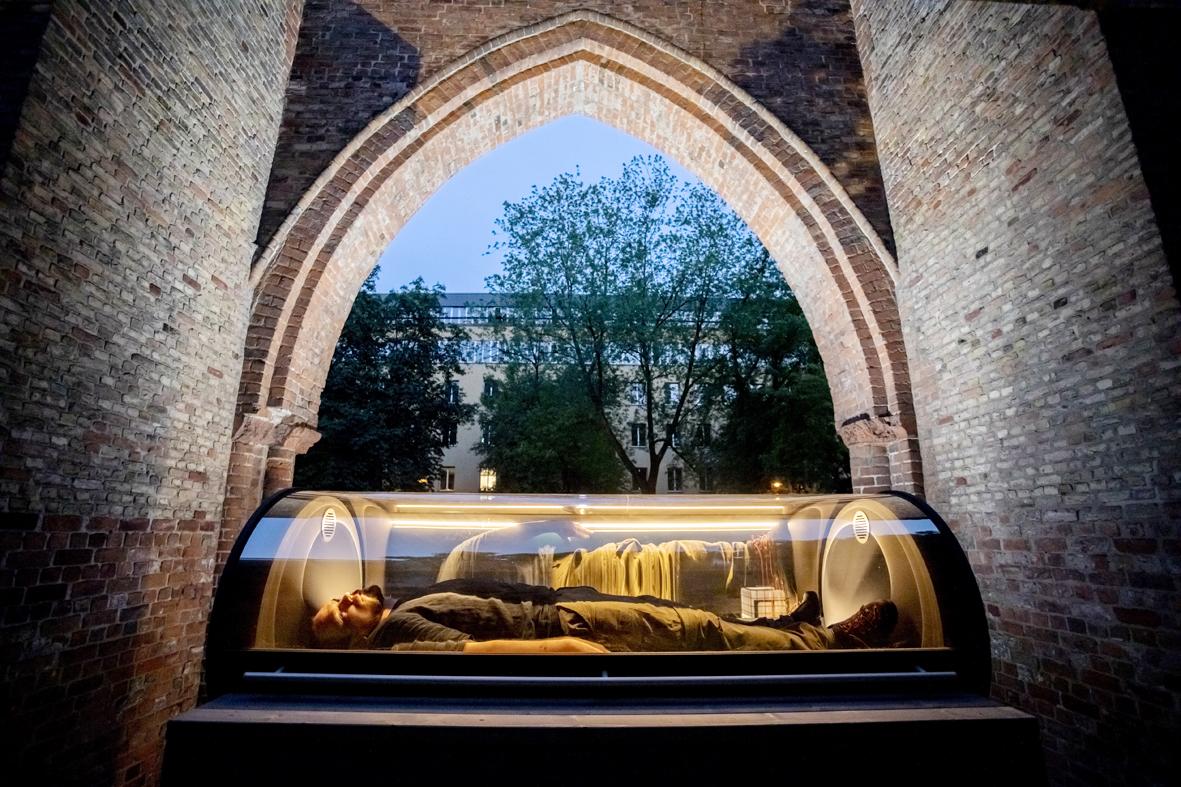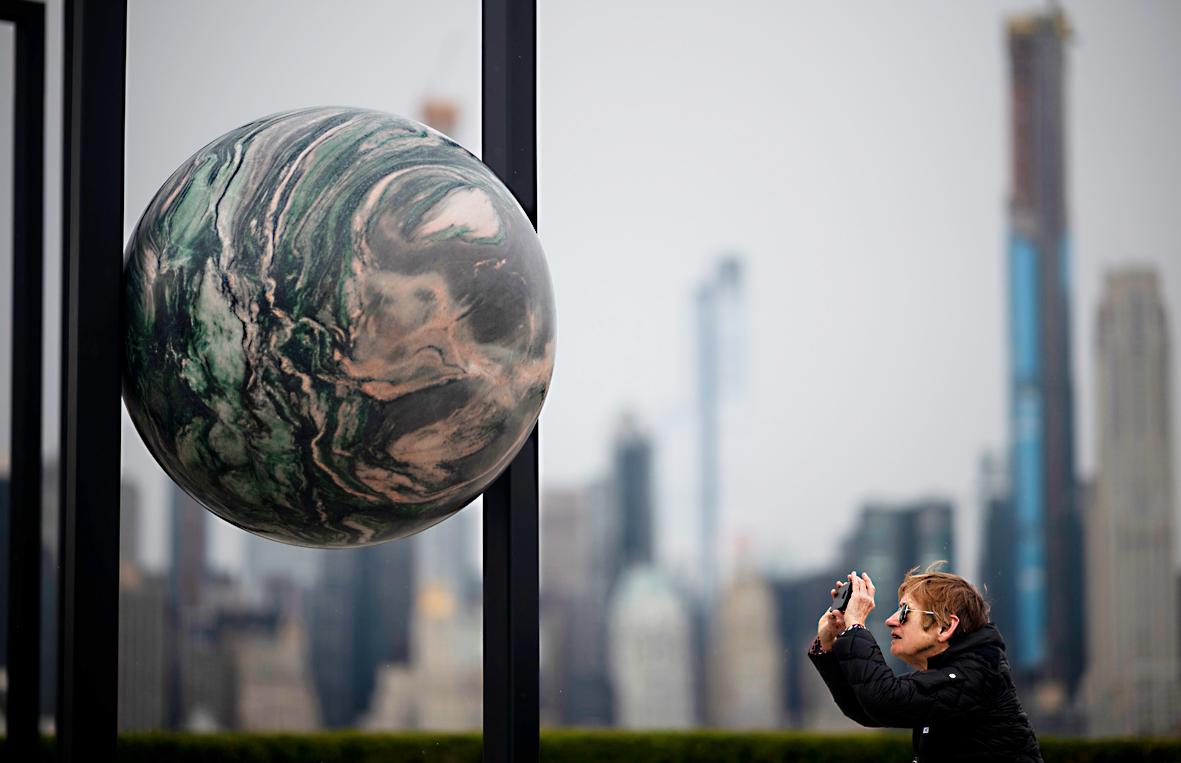Home to some 400 galleries and an estimated 8,000 artists, Berlin has long aspired to be what its politicians call the cultural capital of Europe.
Yet in the coming year, thousands of works by artists including Joseph Beuys, Louise Bourgeois, Bruce Nauman and Gerhard Richter are set to vanish from its galleries, as the city debates what lengths it should go to protect art collectors from the sharp edge of a property boom.
Last month, the Hamburger Bahnhof museum for contemporary art announced that Switzerland-based Friedrich Christian Flick would withdraw his collection of 2,500 modern artworks and take them back to Zurich by September 2021, following a dispute over the Rieckhallen, the hangar-like annex that houses his works.

Photo: AFP
Last week, the me Collectors Room in the center of Berlin, showcasing a private collection of works by Cindy Sherman, Marlene Dumas, Georg Baselitz and others, announced that permanent closure would follow a coronavirus-related shutdown.
Its owner, Thomas Olbricht, the heir to the Wella hair-products company, said his decision to relocate back to his hometown of Essen was personal rather than political, though the building on Auguststrasse, housing luxury apartments as well as the gallery, will have been affected by the five-year rent freeze the city’s senate introduced earlier this year.
And last weekend, the Welt am Sonntag newspaper reported that Julia Stoschek, the billionaire collector, was considering withdrawing one of the world’s biggest collections of contemporary video and multimedia art from the city after being informed of a steep rent rise for her premises on Leipziger Strasse, a former Czech cultural center owned by BImA, Germany’s federal real estate service provider.

Photo: AFP
Berlin’s ambition to match the artistic standing of New York, London or Los Angeles had already been tarnished last December when it was announced that Art Berlin, the city’s foremost contemporary art fair, would be discontinued amid financial problems.
Berlin’s media apportion the blame for these losses to the indifference of the city’s senate.
“Berlin can act as if it is so incredibly dumb,” wrote the listings magazine Tip Berlin. “So dumb that three art collectors are leaving the city within 14 days.”
Der Tagesspiegel, a local newspaper, saw the departure of the Flick collection as “further proof of Berlin’s gradual metamorphosis from a creative hub into a stronghold for property speculators.”
The senate says its hands are tied when it comes to real-estate deals in a city where local and national structures often overlap.
But Stoschek let it be known that it wasn’t so much the imminent rent increase that had frustrated her as the lack of an invitation to find creative solutions, for example by integrating her collection into one of the state’s museums.
“Not being the competent authority doesn’t excuse you from feeling responsible for something,” she said.
For some administrators in Berlin’s local coalition government, where the culture sector has since December 2016 been in the hands of leftwing party Die Linke, declining to pamper wealthy art buyers is also a matter of principle, however.
Thomas Olbricht has permanently closed his Collectors Room in Berlin.
Flick, Olbricht and Stoschek are all heirs of industrial fortunes amassed in the wealthy south-west of the country, and two of those dynasties are not without involvement in the darkest chapter of German history. Flick’s grandfather, Friedrich, was sentenced as a war criminal during the Nuremberg trials for the use of slave labor in his mines and factories. Stoschek’s great-grandfather was a member of the Nazi party and his company played an important role in the production of war materials.
In Berlin, which has a surplus of artists producing works but a shortage of collectors to buy them, even old money with a problematic past was once eagerly courted by Klaus Wowereit, the city’s mayor from 2001 to 2014.
Under the new leftwing Berlin culture senator, Klaus Lederer, the mood has changed, collectors complain. But can they legitimately expect the state to protect them from a property market that is also edging out other, less well-funded cultural institutions, especially as COVID-19 threatens livelihoods across the arts?
The Prussian Cultural Heritage Foundation, which runs the Hamburger Bahnhof museum, has been eager to be diplomatic as it parts ways with Flick. But the manner in which the patron announced his departure, in the middle of a global pandemic, has left some in the city disappointed.
The Rieckhallen annex to the museum that houses Flick’s collection stretches across a plot owned by the Austrian real estate company CA Immo, which wants to expand its “Europacity” complex of high-rise offices and residences and has ruled out selling the land back to the state.

May 18 to May 24 Pastor Yang Hsu’s (楊煦) congregation was shocked upon seeing the land he chose to build his orphanage. It was surrounded by mountains on three sides, and the only way to access it was to cross a river by foot. The soil was poor due to runoff, and large rocks strewn across the plot prevented much from growing. In addition, there was no running water or electricity. But it was all Yang could afford. He and his Indigenous Atayal wife Lin Feng-ying (林鳳英) had already been caring for 24 orphans in their home, and they were in

President William Lai (賴清德) yesterday delivered an address marking the first anniversary of his presidency. In the speech, Lai affirmed Taiwan’s global role in technology, trade and security. He announced economic and national security initiatives, and emphasized democratic values and cross-party cooperation. The following is the full text of his speech: Yesterday, outside of Beida Elementary School in New Taipei City’s Sanxia District (三峽), there was a major traffic accident that, sadly, claimed several lives and resulted in multiple injuries. The Executive Yuan immediately formed a task force, and last night I personally visited the victims in hospital. Central government agencies and the

Australia’s ABC last week published a piece on the recall campaign. The article emphasized the divisions in Taiwanese society and blamed the recall for worsening them. It quotes a supporter of the Taiwan People’s Party (TPP) as saying “I’m 43 years old, born and raised here, and I’ve never seen the country this divided in my entire life.” Apparently, as an adult, she slept through the post-election violence in 2000 and 2004 by the Chinese Nationalist Party (KMT), the veiled coup threats by the military when Chen Shui-bian (陳水扁) became president, the 2006 Red Shirt protests against him ginned up by

As with most of northern Thailand’s Chinese Nationalist Party (KMT) settlements, the village of Arunothai was only given a Thai name once the Thai government began in the 1970s to assert control over the border region and initiate a decades-long process of political integration. The village’s original name, bestowed by its Yunnanese founders when they first settled the valley in the late 1960s, was a Chinese name, Dagudi (大谷地), which literally translates as “a place for threshing rice.” At that time, these village founders did not know how permanent their settlement would be. Most of Arunothai’s first generation were soldiers